I wrote a column last July complaining about Fox Home Video having failed to put out a DVD of Lamont Johnson‘s near-great, largely unsung The Last American Hero, a moonshine-smuggling and race-car movie with Jeff Bridges, out on DVD. And now, almost seven months later, Fox Home Video has put it out on DVD. Pauline Kael loved this film, and Johnson (whom I called last summer) is alive and well and with a lot of stories to tell, so of course, naturally, FHV has put out a bare-bones DVD without any kind of making-of doc or a commentary track from Johnson or Bridges. (I told Bridges about the release of the Hero DVD last weekend prior to the screening of the Harry Nilsson doc, and he didn’t even know about it.) The Last American Hero “was the only high-velocity ’70s redneck film that was any good, and it wasn’t even a redneck film,” I wrote on 7.15. “It was a scrappy piece of backwoods Americana about a young guy on the wrong side of the law who went on to become a famous stock-car racer, a movie that was actually loved by critics and was also an unfortunate financial disaster. For me, this is the super-daddy of redneck movies, the one that got it right with unaffected realism and a kind of dignity by not dealing in the usual cliches and showing respect for its characters, and by being intelligent and tough and vivid with fine acting. Hero was loosely based on Tom Wolfe’s legendary 1965 Esquire article about one-time moonshine smuggler and stock-car racer Junior Johnson. Wolfe’s piece was called “The Last American Hero is Junior Johnson. Yes!” As movies steeped in rural southern culture go, The Last American Hero had roughly the same levels of honesty and sincerity as Coal Miner’s Daughter, which came out in 1980.” Read the Wolfe article, and please, please buy or rent the DVD. (I’m more than a little surprised that none of the leading DVD sites and columnists are even mentioning it, much less reviewing or recommending it. The New York Times‘ usually on-top-of-it DVD columnist Dave Kehr has ignored it entirely, or did in today’s column at least. And you can’t even find the Hero DVD when you do a search on www.dvdtalk.com)
 Jeffrey Wells
Jeffrey Wells
I’ve been a Crash fan
I’ve been a Crash fan all along, but I was impressed and taken aback, even, at how incisively New York Times critic Manohla Dargis, writing in a reader q & a column, has explained why the Academy loves this film as much as they do. “First, Los Angeles, where most of Academy members live, is a profoundly segregated city,” she writes, “so any movie that makes it seem like its white, black, Asian and Latino inhabitants are constantly tripping over one another has appeal. If nothing else it makes Los Angeles seem as cosmopolitan as, well, New York or at least the Upper West Side. Second, no matter how many times the camera picks out Oprah Winfrey on Oscar night, the Academy is super white. Third, the Academy is, at least in general terms, socially liberal. You see where I’m going, right? What could better soothe the troubled brow of the Academy’s collective white conscious than a movie that says sometimes black men really are muggers (so don’t worry if you engage in racial profiling); your Latina maid really, really loves you (so don’t worry about paying her less than minimum wage); even white racists (even white racist cops) can love their black brothers or at least their hot black sisters; and all answers are basically simple, so don’t even think about politics, policy, the lingering effects of Proposition 13 and Governor Arnold. This is a consummate Hollywood fantasy, no matter how nominally independent the financing and release. I also think it helped the film’s cause that its distributor sent out more than 130,000 DVD’s to the industry, insuring easy viewing.”
Here’s another Dargis riff (from
Here’s another Dargis riff (from the same column) that got to me, this time about why she likes Heath Ledger in Brokeback Mountain: “I’ve almost always liked Ledger, but I didn’t think he had anything going on as an actor until Monster’s Ball. But while he was amazing for the 10 seconds he was in that film, I wasn’t prepared for Brokeback, where he creates a world of pain with a tight mouth and a body so terribly self-contained it’s a wonder he can wrap his arms around another person. But here’s the thing — and this is the part that’s hard to explain √¢‚Ǩ‚Ñ¢√É‚Äû√ɬ¨- I don’t just admire the performance on the level of craft, I am also deeply moved by it, just as I am by the film.”
Two days ago (on Sunday,
Two days ago (on Sunday, 2.5), Variety posted a Nicole LaPorte piece that went after internet news and gossip sites (she named Defamer, David Poland‘s Movie City News, MediaBistro.com’s “FishBowlLA” and Zap2It.com) running unconfirmed, un-fact-checked, apparently untrue scuttlebutt about two alleged developments — (a) Universal’s Stacey Snider looking to bail on her job and take a top post at Paramount, with Par’s president Gail Berman getting whacked to make room for her, and (b) ICM and Endeavor looking to merge. Poland’s response has been to note that LaPorte’s story “fails to report the many times that Movie City News has scooped Variety while falsely associating MCN standards [in her piece] with those of self-labeled gossip site Defamer” and to note that despite the touting fact-checking she “failed to contact [MCN] before making self-serving proclamations.” Anyway, that happened last weekend and yesterday. And now here’s another good retort by MCN’s “The Reeler.”
Gong Show
If you go to a movie this weekend chances are you’ll run into the poster for Oliver Stone‘s World Trade Center (Paramount, due in late summer or early fall) hanging in the lobby. And if you’re at all like me, you may experience a slight involuntary twitching when you stand there and take it in. Not out of disdain for the visual concept (which is okay), but that godforsaken title. The wretched sound of it, I mean.

World Trade Center just keeps needling me. I’ve tried to get used to it, but that generically odious Jack-and-Jill quality (every time I hear it a J. Arthur Rank gong goes off in my head) makes it one of the worst big-studio movie titles of all time.
It seems to me that a movie set in lower Manhattan on 9.11.01 would have to be direct, honest and dignified…and yet try for a touch of the poetic. If you believe that titles should somehow correspond to content, the name of Stone’s movie should be about an echo of some kind…not about a redundant fact, but soul particles lingering in the air.
The title World Trade Center is about duhh-level marketing…about snagging the lowest common denominator, and the hell with poetic import.
You can hear somebody on Gerry Rich’s advertising team saying to a colleague, “Nobody will look at this one-sheet and not know right away what it’s more or less about…nobody. And no one will be able to point their finger at any of us after the opening weekend and say we made it seem too oblique.”
Try offensive. World Trade Center isn’t “overkill” as much as idiotkill. All good titles work on at least two levels, and World Trade Center doesn’t even work in terms of pure one-note simplicity. It sounds like a compromise produced by a committee of scared people.
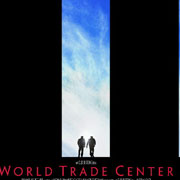
A portion of Paramount World Trade Center one-sheet, as it appears in USA Today story out today (Friday, 2.10)
The image of two guys standing side by side between the Twin Towers is a little dumb-assed (the 9.11 disaster wasn’t a personal/intimate experience for anyone, including the two Port Authority guys who were covered and trapped in rubble), but it’s tolerable.
USA Today‘s Anthony Breznican has written that Paramount “hopes the image reflects that filmmakers are trying to approach America’s greatest modern tragedy with respect.”
Breznican says the studio “decided to emphasize mood, while the stars’ and director’s names are downplayed. There’s an abstract reminder of the twin towers instead of an actual photograph of the buildings intact, or in ruins. The red, white and blue colors imply it’s an American story — not a tale of terrorists or politics.”
The true story of Port Authority police officers John McLoughlin and Will Jimeno (i.e., the guys who were bured and eventually rescued), World Trade Center costars Nicolas Cage and Michael Pena along with Maggie Gyllenhaal, Maria Bello, Frank Whalley, Nicholas Turturro and Thomas Mapother.
Gooney Bird
Several weeks ago I wrote a little thing about how Mel Gibson looked like a totally wacked John Brown with that flannel shirt and wild-ass beard in that flash-and-he’s- gone appearance in his Apocalypto trailer.
And now following the posting this morning of Gabriel Neeb‘s letter that called Bravheart‘s Best Picture Oscar win an embarassment(i.e., “a post-Passion of the Christ reassessment”), some guy has written in to set me straight:

Mel Gibson
“Did you know you’re being laughed and mocked in movie websites all over the internet because you didn’t realize that it was a joke when Mel Gibson appeared in his trailer? Of course it was a joke, you silly hypocritical prick! Anyone who knows anything about show business, knows that Mel Gibson is the biggest prankster in the business.
“And you should have also known that his beard was being grown in for a part in Under and Alone, but you just wanted to make judgments because you don’t like his politics and because you don’t understand his religion. And now you want to take away the honor of his Oscar win for Braveheart, because you don’t care for The Passion. Again, you’re a stinking PRICK!!” — Jeremy Cohen .
Measure of Ledger
Heath Ledger submitted to a friendly dog-and-pony show at the Santa Barbara Film Festival last night (i.e., interviewed by Pete Hammond on the stage of the Lobero theatre, watched several film clips, accepted the festival’s Breakthrough Award), and I’m a tiny bit stumped.
It was a nice evening…pleasant, heartening…and Heath seems like a right guy, but I don’t know what to say about him that doesn’t sound cliched or repetitive or flat.
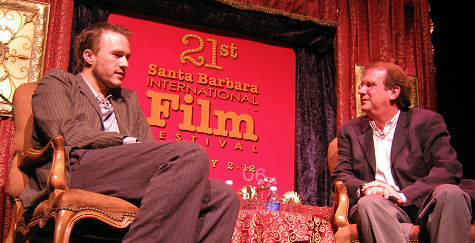
Heath Ledger, Pete Hammond on stage of Santa Barbara’s Lobero Theatre — Wednesday, 2.8.06, 8:25 pm.
He’ll be around for a long time, I think. That seems like a fairly safe bet. He’s 27 now — he’ll probably still be acting 40 or even 50 years from now, and in quality vehicles, given his standards and talent. I’ll be dead (probably) and he’ll still be acting. Nice thought.
I’ve never written a damn word about Ledger’s performance as “Skip” in The Lords of Dogtown because I never gave a shit about watching it (due to laziness…I had nothing against the film), but after watching him in a clip or two last night I now want to see it whole.
I think Ledger may be a bit like Laurence Olivier and Alec Guiness, which is that without a role to play (or a fake nose or an exotic accent to hide behind) he congeals and stammers on a bit and isn’t quite up to the charm levels of Jay Leno or Conan O’Brien or Jimmy Kimmel in front of a crowd.
Ledger is a gently spoken sort with what feels like a fairly strict sense of integrity. It’s no secret that he has one of those serious light-up-the-room smiles. Being Australian and somewhat expressive and non-taciturn, his voice isn’t the least bit Ennis del Mar-ish, but it does have a deepish timbre and a kind of rolling tonality.
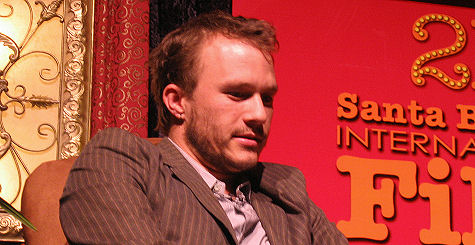
Heath Ledger — Wednesday, 2.8.06, 8:32 pm.
He’s a gifted, probably genius-level actor who right now seems to be about sixteen times more into spending time with his infant daughter than making new movies and pocketing huge paychecks, and is actually planning on not working at all for roughly a year. (He said something about living in Amsterdam when we spoke at the Focus Features after-party following the Golden Globes.)
I liked it that there was a loose tab or some kind of mini-tongue sticking out of the heel of his lace-up shoes, and I was staring at this thing for a while and thinking, “Yeah, funky-ass shoes…but I guess that’s Ledger and his I’m-not-your-father’s- idea-of-an-uptown-actor attitude.
He was pretty good at fidgeting around in his seat last night as he spoke to Hammond about this and that. He sat on his hands for a bit. His legs were kind of tucked under the chair, a bit like a British school kid doing detention. He said that auditions have always been awkward because he doesn’t like the feeling of being examined and judged.
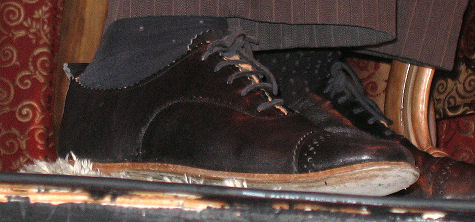
Heath Ledger’s shoe — 2.8.06, 8:40 pm. See that little doo-dad thing sticking out of the heel? That’s intentional, right?
Here’s that Manohla Dargis riff about Ledger’s Brokeback Mountain performance that I ran in WIRED last week: “I’ve almost always liked Ledger, but I didn’t think he had anything going on as an actor until Monster’s Ball. But while he was amazing for the ten seconds he was in that film, I wasn’t prepared for Brokeback, where he creates a world of pain with a tight mouth and a body so terribly self-contained it’s a wonder he can wrap his arms around another person.
“But here’s the thing,” she concluded, “and this is the part that’s hard to explain — I don’t just admire the performance on the level of craft, I am also deeply moved by it, just as I am by the film.”
SBFF director Roger Durling said the following at the end of the evening: “Movies reflect who we are, and in going to the movies we identify with the heroes and protagonists. When I saw Brokeback Mountain and Heath Ledger’s performance, I felt as if somebody had punched the wind out of me.
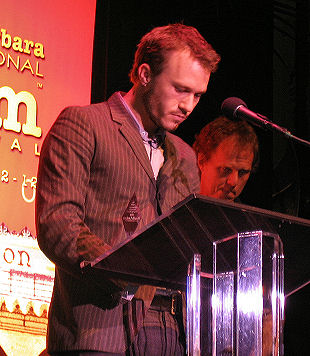
Wednesday, 2.8.06, 9:55 pm.
“It took me a while to understand that never before I had seen a character in a major Hollywood film that portrayed all the loneliness, self-loathing, the need to be loved and give love back that a gay man like me goes through, and I felt a personal form of catharsis watching Heath’s performance. He was kicking a door open that had been long shut, and for that I’m very grateful.”
I’m still stuck about the Best Actor contest because I feel exactly the same degree of admiraton for Philip Seymour Hofman’s performance in Capote as I do for Heath Ledger’s in Brokeback. I’ve called for this before and it makes no sense and it’s highly unlikely from a mathematical perspective, but there should be a tie and they should both win. This really, really should happen.
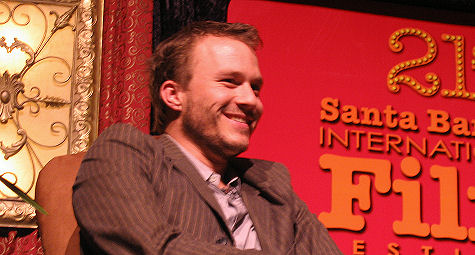
Wednesday, 2.8.06, 8:25 pm.
Grabs
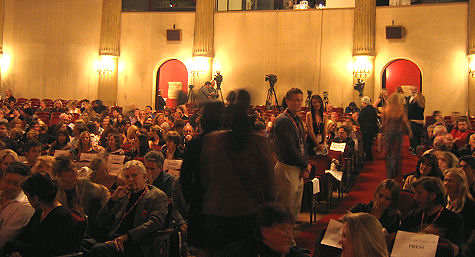
Crowd at Lobero theatre prior to Heath Ledger appearance — Wednesday, 2.8.06, 7:40 pm.
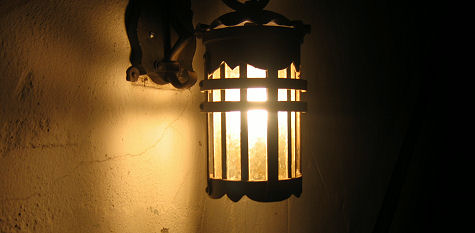
Tuesday, 2.7.05, 11:10 pm.
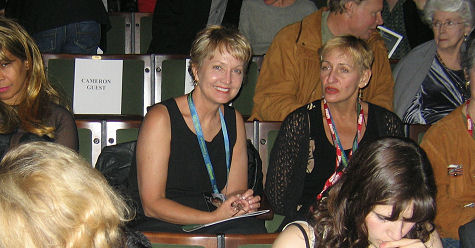
Texas ladies at Monday’s Jim Cameron sit-down — Monday, 2.6.06, 7:40 pm.
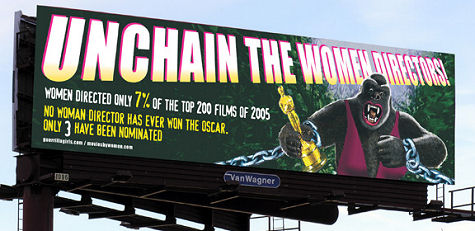
Billboard currently viewable in downtown Hollywood
Unto Himself
Not so many years ago, James Cameron was a formidable Hollywood heavyweight — a hard-driving director of audacious, emotionally gripping audience-friendly films like Titanic, T2: Judgment Day, True Lies, etc. He was one of the Big Guys…in the Spielberg realm with a legend, a following and a potent aura all his own.
But after Titanic he started backing away from features and concentrating more and more on underwater exploration (particularly the haunted remains of the Titanic, which he’s visited 33 times) and making undersea documentaries and generally turning into a deep-dive tech head.
Eight years and two months have passed since the release of the multi-Oscar-winning Titanic, Cameron’s biggest hit and the largest-grossing film in history, but he seems more invested than ever these days in his really-rich-guy, super-expensive, tinker-toy delvings into underwater exploration and making documentaries about same.
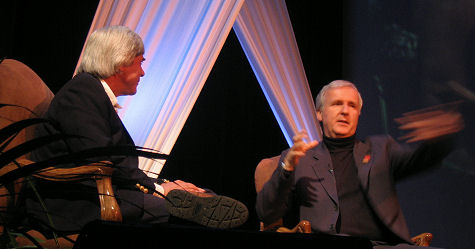
Some nice-guy diving buddy with an engaging personality (forgot his name…sorry!) interviewing James Cameron at Santa Barbara’s Marjorie Luke theatre — Monday, 2.6.06, 8:25 pm.
I’m basing this view on comments Cameron made at last night’s tribute to him at Santa Barbara’s Marjorie Luke theatre, as well as the focus of the evening, which was all about underwater this and that (which explained the sponsorhip by the Santa Barbara Aquarium) and nothing at all to do with Hollywood movies or escapism in general.
Cameron’s sit-down interview session lasted almost two hours, and there wasn’t a single word spoken, even in passing, about Battle Angel, a fururistic, super-sized 3-D feature that Cameron has stated will begin production early in 2006, according to a q & a interview he did last September with the Hollywood Reporter‘s Paula Parisi.
In his remarks at the podium after accepting the festival’s Attenborough Award, Cameron said he places a higher value on the “process” of working with his team of 15 people in their underwater explorings and the technological refining of deep-dive hardware, etc., than working with a production crew of 100 or 110 people on a film.
He said that this process was more important to him than the documentaries that have resulted (or will result) from these excursions.
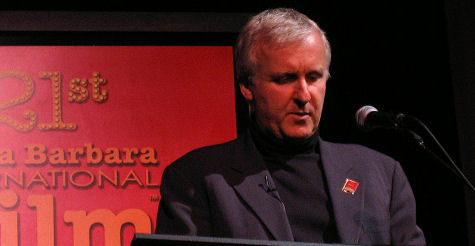
James Cameron at the podium after receiving the Santa Barbara Film Festival’s Richard Attenborough Award, given in loving memory of Sir Dickie’s direction of A Chorus Line and his performance as the wacky geneticist in Jurassic Park. Yes, I’m kidding. It’s just called the Attenborough Award.
Cameron also said that he also values the act of “exploration” in and of itself more highly than on any documentary record of same.
In other words, the nuts-and-bolts aspects are providing much more personal satisfaction than creating a mesmerizing entertaining film (or films) about what he and his team are doing down there.
Except for my friend Cherry Kutac, a Houston-based publicist who feels that Cameron’s deep-dive activities are just as moving and awesome as his Hollywood films, pretty much everyone I spoke to at the after-party said they respect Cameron’s undersea activities, but that they also feel kind of underwhelmed at the same time.
They said that Cameron seems to be doing what he’s doing because he’s rich enough to do whatever he wants, and that as worthy and valuable as his undersea exploration and documentary work is, he seems to be farther off the Hollywood boat than ever before, and that he seems to be more of a eccentric rich-guy explorer than any kind of mover and shaker in the narrative filmmaking realm, like he used to be.
The way I see it is this: I’m glad Cameron is enthused and satisfied and doing what he wants to do, but docs about underwater exploration aren’t as moving or sexy as creating stories and legends about human strivings upon dry land.
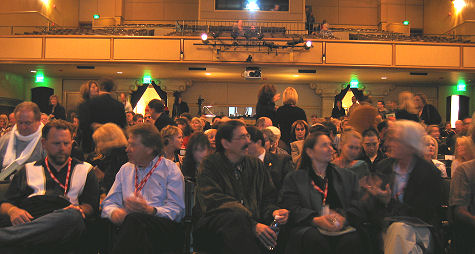
Truth be told, the audience at the Marjorie Luke theatre wasn’t as large as it could have been. (The house was about 70% full — less if you count the balcony.) I think this was because Cameron hasn’t made a real audience-pleasing movie since the middle of the Clinton administration.
Cameron used to be a Vanity Fair/Time/American Cinematographer-type guy — now he seems to belong more to the realm of IMAX films, the Discovery Channel and the National Geographic.
I’m not saying Cameron won’t be making Battle Angel sometime soon, but if he were going to do this wouldn’t the film at least have been mentioned during the tribute? It seems weird that a film of such size (it’s been projected to cost about $200 million) and new-styled visual design didn’t even merit a mention.
Cameron told Parisi last September that Battle Angel, an adpatation of the Japan- ese graphic novel by Yukito Kishiro, will be shot with a mix of “real sets and CG characters,” and that “we’re planning to be in theaters in 2007, releasing it in 2-D and 3-D.”
Cameron described Battle Angel as “the story of the journey of a teenage girl who has a human brain in a synthetic body,” or a variation on Robocop.
“It takes place in the 26th century, [and] it’s a quest for identity, mainly, with a lot of samurai- and kung-fu-type action [that] becomes s story about making a stand, deciding to do something to change the world for the better.”
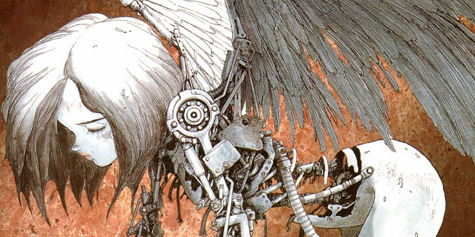
Bend-over panel from “Battle Angel” graphic novel
Parisi asked Cameron at one point if he would be manning the cameras himself on Battle Angel and he said he would be. “Everybody keeps asking when we start shooting,” he said, “and I don’t know because with all the other stuff we’ve had to work out, shooting will probably be the least challenging part of it.
“But it’ll probably be in January or February [of ’06],” he said.
Touched God, Mostly Died
I was moved by John Scheinfeld’s Who is Harry Nilsson (and Why Is Everybody Talkin’ About Him?), which had its debut screening at the Santa Barbara Film Festival last Saturday evening…and also, to be honest, a bit bummed and a tad bored. Sorry, but that’s what happens when your story‘s about a guy who had everything to live for but decided to drink himself to death.
One of rock music’s most gifted songwriters and melody-makers, Harry Nilsson lived for 53 years. But the heart of his life was a period of eight years — roughly from ’66 to ’74 — when he wrote or sang “Without You,” “Everybody’s Talkin’ At Me” (the famous Midnight Cowboy tune), “One,” “Daybreak”, “Coconut,” “Jump Into the Fire” and the world-famous hurtin’ lyric, “You’re breaking my heart, you’re tearing it apart, so fuck you.”
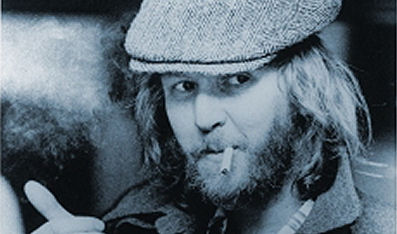
Harry Nilsson, sometime around 1973
Nilsson’s first 25 years were formative (he was born in 1941) and the last 20 were about self destruction — booze, drugs and who knows how many tens of thousands of cigarettes. His parents both died in their 50s so maybe he believed it was in the cards, but Nilsson’s heart finally quit for good in February 1994, just before the big L.A. earthquake.
Obviously those eight years were blessed, shining, God-imbued. The parts of his character that would eventually lead to his death were present and pulsing, but the creative instincts ruled and he was truly king of a kingdom then. The Beatles, Randy Newman and Brian Wilson worshipped Nilsson, and so did everyone else in the music industry along with the millions of fans.
I loved hearing the story of how Nilsson’s listening to the cadence of a busy tone when he was calling a woman led to the same cadence in the opening piano chord of “One (is the Loneliest Number),” the Three Dog Night song that he wrote in ’66 or thereabouts.
This sounds contradictory, but I also loved hearing about the bad-ass behavior before Nilsson’s life turned bloated and pathetic…like the time when he and John Lennon, drunk as skunks, were thrown out of the Troubadour in 1974 after heckling the Smothers Brothers and acting, in the words of club owner Doug Weston, “very Irish pubbish.”
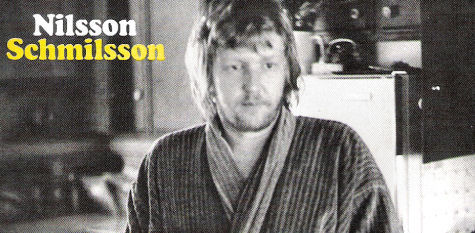
The problem with Scheinfeld’s doc is that the last 40% is about the suicide years, and the fact that they weren’t bittersweet or tragic in the least. And the fact that Scheinfeld, to his credit, doesn’t try to portray them in any other light. It’s not how he made the film that doesn’t feel quite right — it’s the woozy, boozy story he honestly tells.
They were just about waste and rich-guy arrogance and Nilsson’s low self-esteem (sired by his dad leaving the family and disappearing when he was three years old) and a downward spiral that went on and on. Frankly? From a dramatic standpoint Nilsson’s life would have been more stirring if he’d died younger and thinnner and less ruined in a drunken car crash in 1975.
The swirling-toilet-water years, I’m guessing, were also about the “friends” who shook their heads a bit sadly but who mainly chuckled at Nilsson’s carousing.
Somewhere among the many talking heads in Scheinfeld’s film, I feel, are at least one or two enablers….the sort of people who laugh and backslap when a guy has a problem that’s taking him down. I have a notion that the love and affection they say they had for Nilsson when he was alive wasn’t quite as sincere as it seems to be in front of Scheinfeld’s camera.
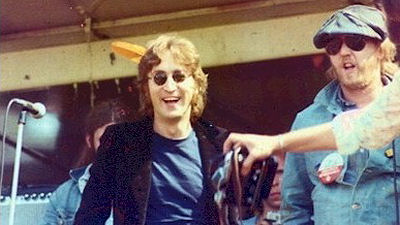
John Lennon, Harry Nilsson around ’73 or ’74
“I loved Harry when he was alive but only as far as I could because of who he was …and there just wasn’t much you could do,” they all seem to say. This attitude is the elephant in the middle of the room of this film, and after a while you can smell it.
The talking heads include music producer Richard Perry (who produced Nilsson’s best album, “Nilsson Schmilsson”), Brian Wilson, Robin Williams, Paul Williams, Rndy Newman, Van Dyke Parks, Yoko Ono, May Pang, Dick and Tom Smothers, Terry Gilliam, Mark Hudson, Micky Dolenz and Ray Cooper.
The mid ’60s to the late ’70s were about uncorking the constipation and repression that younger adults of the time went through when they were kids and being raised by their World War II-generation parents. And artists have always felt that kicking out with drugs, drink and bacchanalian behavior of any variety is their basic due for creating their creations.
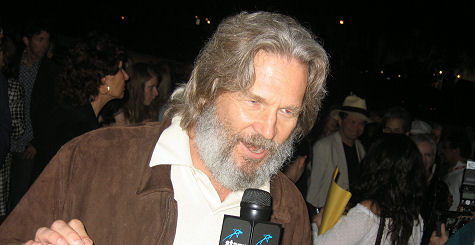
Jeff Bridges in “old man River” mode prior to Saturday’s Who is Harry Nilsson? screening at Santa Barbara’s Lobero theatre, around 6:30 pm.
It all goes with the territory, I guess, but throw these two together and you had one of the most widespread and longest-lasting periods of debauchery in the history of Western Civilization.
But even with all this going on, could there have been anything more despicable for Nilsson to have done (short of hurting others in some way) than to ruin himself with animal indulgence (he even managed to destroy his singing voice) and kill the golden goose within?
As Eric Idle says near the beginning, Nilsson “loved to party and he got that…and the end it got him.” Nilsson’s songs were great but the sad aesthetic of his life — the dramatic arc of Scheinfeld’s film — is what a complete wastrel he eventually became.
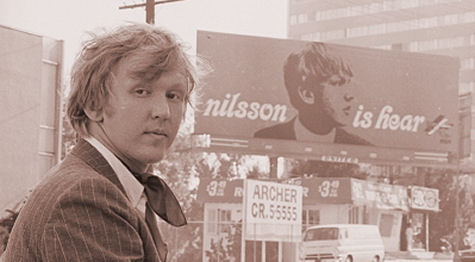
This said, Scheinfeld does an excellent job of telling Nilsson’s life story — I can’t imagine a more comprehensive job — but so many rock ‘n’ rollers have bought the farm early on due to drugs and booze that there’s no tragic dimension to it.
I don’t know when the movie will hit theatres or DVD or cable TV, but sooner rather than later, I’d expect. It’ll sell to the geezer-rock crowd and anyone who respects Nilsson’s music, which would be anyone who respects music, period.
You broke my heart, Harry…you tore it apart, but fuck you for all your brandy chugging and spending way too many years shitting on your gift.
Nilsson Syndrome
“Interesting piece about the Harry Nilsson doc. It reminds me of so many life stories of artists — the last act always sucks.
“I just read two biographies of the much underrated poet Edna St. Vincent Millay, who, in an interestingly modern turn, got herself addicted to pain-killers after a horrendous car crash. She lost the only copy of a major work in a hotel fire (that’s what they had in those days instead of computer crashes), got deserted by most of the people she cared about — including her public and the critics, whose vitriolic backlash continues to this day (She was a performer not a poet, supposedly — the first rock star of poetry, but a second rate writer).
“Best advice when reading (or watching) an artist’s bio — skip the last fifteen years. It’s certainly true of my Dad. No happy endings for artists.” — Steve Axelrod
Grabs

Five or six miles north of Los Olivos, California (which is northwest of Santa Barbara) and just off the road. Los Olivos is the little town with that wine-bar restaurant where Paul Giamatti and Thomas Haden Church had that drink-and-dial dinner with Virginia Madsen and Sandra Oh in Sideways
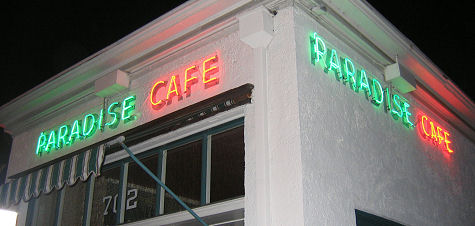
Santa Barbara’s Paradise Cafe — Sunday, 2.5.06, 9:45 pm

Sunday, 2.5.06, 4:40 pm

I’ve been eating Mexican food in this place for years. It never attracted the upscale crowd (and good riddance) and always felt like a place ou might find in Vera Cruz, for locals and backpackers on a budget. It was big and roomy with high ceilings, and there was always annoying salsa music playing too loud on the jukebox. And now it’s gone, soon to be replaced by some dink-yuppie bar.
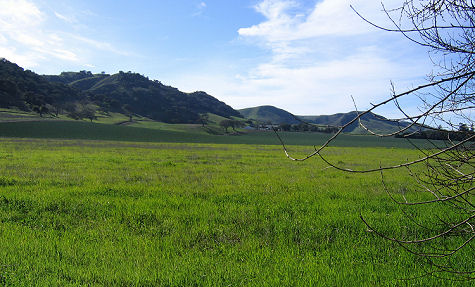
Near the small town of Los Alamos, California — Sunday, 2.5, 4:45 pm.
Love Is Strange
Mozart and the Whale, which screened yesterday afternoon at the Santa Barbara Film Festival, is a Rain Man-type love story with a jumpy heart. Jumpy as in child- like, energetic, anxious.
A romanticized, tidied-up version of a complicated real-life love story, it’s about a youngish couple (Josh Hartnett, Radha Mitchell) with autism, or more particularly Asperger’s Syndrome. And this, viewing-wise, is nervy and provocative in more ways than one.
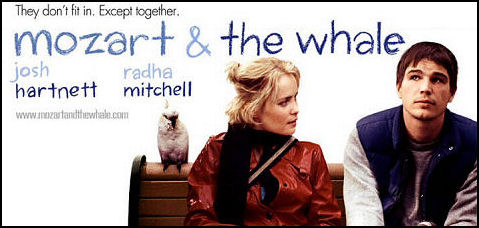
It’s not calming or swoony like other love stories because the lovers are always in a fairly hyper and unsettled state, which feels a bit challenging, but it seems real and fairly honest and is obviously on a wavelength all its own.
At first you’re thinking it needs a regular-guy character (like Tom Cruise‘s selfish prick in Rainman) to provide stability and perspective, but then you get used to the manic energy of it.
And then you start enjoying more and more the vigorous cutting and the funky European-style tone (Norway’s Petter Naess directed), and particularly Hartnett and Mitchell’s performances, which feel wired and fresh and unlike anything I’ve ever gotten, tonally, from a love story before.
I guess this pogo-stick element isn’t striking a chord with very many others since Mozart and the Whale has been having difficulty finding a distributor.
Shot in early ’04, Mozart and the Whale has been released overseas and has even hit the DVD market in places like Greece and Brazil, but a U.S. theatrical release hasn’t happened and looks at this moment a bit dicey.

Rhada Mitchell, Josh Hartnett in Mozart and the Whale
Even Hartnett, who went to Sundance to do interviews for the mostly shitty Lucky Number Slevin, isn’t standing behind Mozart . His portrayal of Donald, a child-like mathematical genius, is easily the bravest, most emotionally wide-open thing he’s ever done, and the guy’s not here in Santa Barbara to help plug it. This seems to me like a real jerk move.
I was talking about Hartnett yesterday with a TV producer as we stood on State Street just before noon, and the TV guy told me Hartnett has “the biggest ego in the industry” and that he’s making curious calls about the films he’s starring in (Lucky Number Slevin being one glaring example) and he’s “turning stuff down left and right” and nothing he’s acted in so far has quite caught on in the right way and that his career is cooling off.
But he’s done something brash and unusual in Mozart, and he should be standing by the people who took the journey with him. Even if you happen to prefer Dustin Hoffman’s quieter, more internalized autistic behavior in Rainman (which wasn’t my reaction, not by a long shot), Hartnett’s willingness to take a flying leap and go for it is admirable and exciting.
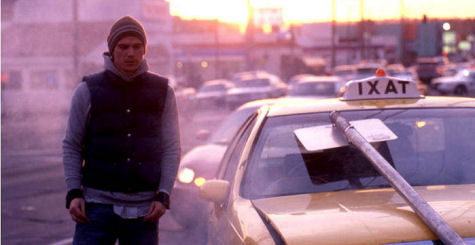
Josh Hartnett in Mozart and the Whale
For what it’s worth, a woman who said she has an autistic child stood up after yesterday’s screening and said Hartnett’s performance is authentic and spot-on. And people from Europe who are claiming to be autistic (or are close to autistic people) who’ve seen the DVD are saying the same thing in online chat rooms.
Lawrence said during the post-screening q & a that “we’re very disappointed that Josh couldn’t be here.” The IMDB says Hartnett is currently filming Texas Lullaby, a present-day retelling of “Hamlet”, but if he could attend Sundance in Park City for a weekend why couldn’t be come to Santa Barbara?
Written by Rain Man screenwriter Ron Bass, Mozart and the Whale is nothing if not alive to the moment. It’s a little twee at times and vigorously paced, but it’s not a comedy, despite what you might have read elsewhere. Call it amped or cranked up but it feels more original than not.
It’s a spirited tale about two childlike souls, Donald and Isabelle, dealing with the peaks and valleys of a turbulent love affair, but also trying to seriously build a life together.
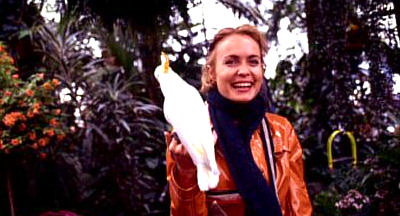
Donald (Hartnett) is a kindly eager-beaver who keeps birds in his stinky cluttered apartment and, like Dustin Hoffman’s Raymond, has a genius-like ability with numbers. He works as a taxi driver but is also an organizer of an autistic support group. He copes well but doesn’t adapt well to change.
Isabelle (Mitchell) is also austistic but bohemian. Her life-coping skills are more refined than Donald’s and she’s more goal-oriented, but in a way she’s more manic and volatile, and she has a way of setting Donald off…and vice versa.
Austistic boy meets autistic girl, they fall in love, they break up, they get together again, they break up again and get back together again and finally get married. A familiar-sounding plot, perhaps, but with odd angles and tender weirdnesses.
Whale was filmed in Spokane, Washington. The costars are Gary Cole, Allen Evangelista, Sheila Kelley, Erica Leerhsen, John Carroll Lynch, Nate Mooney and Robert Wisdom.
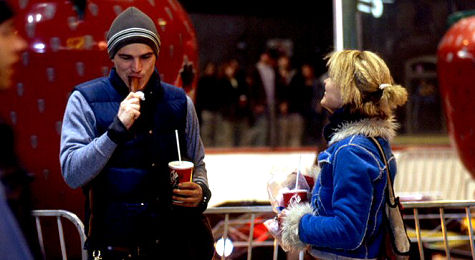
The only reps at yesterday’s screening were producer Robert Lawrence and Jerry Newport, the real-life model for Hartnett’s Donald (i.e., the original “whale”).
Newport’s real-life story will soon appear in a book he co-wrote with wife Mary and former People writer Johnny Dodd (who was also at the screening) which is called “Mozart and the Whale: An Asperger’s Love Story.”
I searched around and found a poster for the film with an alternate title — Crazy in Love — which is vaguely offensive, if you ask me. Autistics are different but hardly nutso. They get life as fully and completely as anyone else, and seem to process it, in some ways, with above-average passion and even ecstasy.
Since taking over Paramount Pictures
Since taking over Paramount Pictures last year, Brad Grey has cemented a reputation as the Maximilien Robespierre of studio chiefs — a guy who’s a lot better at chopping off heads and creating an atmosphere of terror than bringing about the kind of inspired changes that might lead to the bolstering of Paramount’s stock through the making of really superb films. The whispered verdict around town is that Grey is (I need to put this delicately) (a) a lightweight , (b) out of his depth, and (c) not a man of commanding insight, vision or wisdom as far as the basic building blocks are concerned. Here’s a Sunday (2.5) Laura Holson N.Y. Times piece that seems to recognize what people are saying and what may be going on in Grey’s head, but at the same time seems to equivocate here and there.
I had a couch-jumping epiphany
I had a couch-jumping epiphany while listening to Robert Towne expound last Friday evening at Santa Barbara’s Victoria theatre. I’m referring to the media meltdown that Towne’s friend (and Ask the Dust producer) Tom Cruise went through last year, which led to the term “couch-jumping” or “couch-jumper” being added to the dictionary after Cruise’s burst of athletic jubilance on Oprah Winfrey’s show last summer. Listening to Towne led to thoughts of Cruise, and it suddenly hit me that we’re all seized at one time or another by a couch-jumper mentality (exuber- antly manic, a hyper-edgy attitude). We all go there from time to time, depending on the breaks or the turns in the road. Cruise’s error wasn’t to be in this head-space, but to allow this phase to be dramatized in the media.
There’s no such thing as
There’s no such thing as a good time or a bad time. There is no love or hate, no happiness or sadness…no short or tall, black or white, hunger or gluttony, sweet or sour. The Bhagavad Gita teaches that all changes and transitions are temporary illusions, and whether it’s heads or tails it’s always the same cosmic coin. Only suckers feel happy when their ship comes in and their bellies are full, and lament when their milk is spilt and their lovers have left.
It took me two hours
It took me two hours to write a piece this morning about a Harry Nilsson documentary that I saw Saturday night. Then the browser crashed because of a too-large Quicktime video file I tried to watch, and I hadn’t saved the article so I lost the whole thing and I’m livid, on top of which I haven’t kept up with the WIRED items over the last couple of days, I have a screening to catch in 90 minutes, there are three or four invoices that need to be sent in and there’s a phoner I have to do with Rupert Murray, director of Unknown White Male and I don’t care if this sounds like whining (which it is, of course)…sometimes burnout comes so quickly.
This is desperate-sounding chitter-chat on
This is desperate-sounding chitter-chat on one level, but on another level it’s kind of fun. It would be startling, of course, if Crash were to take the Best Picture Oscar away from Brokeback Mountain. It won’t happen, but it would be fascinating if it did. I would survive and so would Ang Lee and James Schamus, and the world would not be that different a place the morning after…but c’mon. We’re all pretty sure what’s going to happen. I think.
I missed mentioning this yesterday,
I missed mentioning this yesterday, but there’s a second showing of Werner Herzog’s Grizzly Man — in my view the finest and without question most critically honored documentary of 2005 — on the Discovery Channel this evening (Saturday, 2.4) at 8 pm.
Carlos Reygadas’ Battle in Heaven,
Carlos Reygadas’ Battle in Heaven, a follow-up feature to his widely acclaimed Japon, is getting most of its attention because of a depiction of a dull schlumpy guy being orally serviced at the beginning and end of the film. It’s a blowjob that seems rote and passionless and is certainly boring to watch (it isn’t remotely in the league of the Brown Bunny finale). The provider is a pretty and sophisticated young girl of 17 or 18 from a wel-to-do family, and the receiver is a homely middle-aged lump with inexpressive eyes and a gross pot belly. And he’s not reacting in any noticable way — he could be standing in front of a mirror with a tailor measuring the cuff of his pants. For me, the nothingness of this scene is indicative of the nothingness of the film itself.
